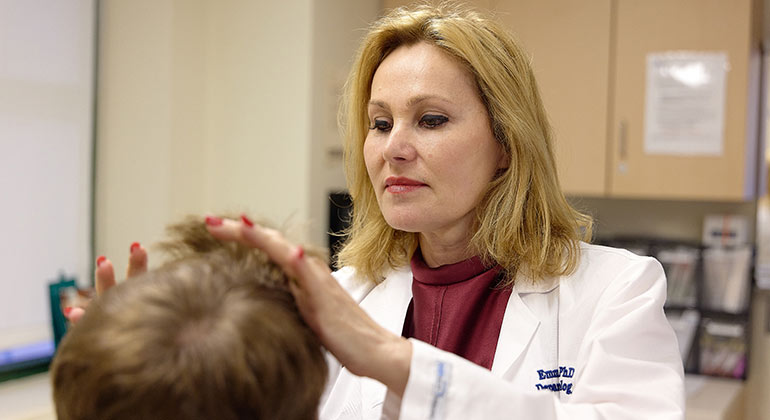Hair and Nails
At the Mount Sinai Health System, we can diagnose and treat a wide variety of conditions related to hair and nails. Our expert dermatologists are here to address your needs:
- Alopecia refers to hair loss and can affect both men and women. Some types of alopecia cause scarring. Some examples include androgenetic alopecia, alopecia areata, lichen planopilaris, and others. We develop a treatment approach based on the type of alopecia you have. The Alopecia Center of Excellence located at the Icahn School of Medicine at Mount Sinai, provides the most advanced treatments including platelet rich plasma (PRP).
- Seborrheic dermatitis causes red, greasy marks or scaling on the scalp and face. It tends to come and go in adults. There is a variety of treatments available to help. Dandruff is a less severe form of this condition. When infants have this condition, we call it “cradle cap.” Most babies outgrow cradle cap within 6 to 12 months.
- Folliculitis is inflammation of hair follicles. It can appear anywhere on the body, but is most common on the scalp. It is generally not dangerous, but may need treatment in certain cases.
- Head lice (pediculosis capitis) is an infestation of the scalp and it usually affects in pre-school- and elementary school-aged children. Transmission occurs through direct contact and you need treatment to get rid of the bugs. Over the counter treatments are usually effective.
- Tinea capitis is a fungal infection of the scalp that causes itchiness, hair loss (alopecia), and swollen glands in the neck. It is easily transmitted. You have to use antifungal medication to eliminate it.
- Scalp psoriasis refers to psoriatic plaques on the scalp. These can appear as thick red plaques with overlying scale. Medicated shampoos, topical solutions, injections, and systemic therapies can help.
- Ingrown nails occur when the nail plate grows into, rather than over, the lateral nail fold. When you get an ingrown nail, your body reacts with redness, pain, swelling, and sometimes pus. Home remedies include soaking the area in warm water and gentle retraction of the nail fold. If you have severe discomfort or if it keeps coming back, you should see a dermatologist.
- Nail fungus (onychomycosis) causes discolored, thickened nails. Over the counter treatments exist, but do not work well. Mount Sinai dermatologists can help. Nail changes can indicate a larger problem. If you see changes in your nails, you should check it with your dermatologist.
